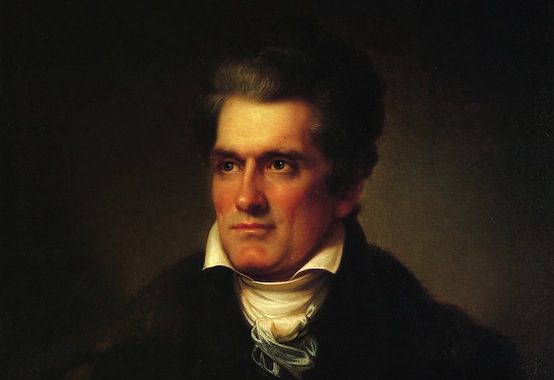Calhoun and Counter-Majoritarianism

In the current issue of National Review, Jonah Goldberg and Ramesh Ponnuru rebut Sam Tanenhaus’s description of the GOP as the party of Calhoun. They accuse of Tanenhaus of assigning guilt by association, and very loose association at that. According to Tanenhaus, Calhoun was “the Ur-theorist of a burgeoning but outnumbered conservative movement…” Goldberg and Ponnuru observe that there’s little evidence for this:
in George Nash’s universally respected book The Conservative Intellectual Movement in America Since 1945, Calhoun’s name appears twice…Calhoun is absent from the memoirs of the supposedly “Calhounist” William Rusher, the longtime publisher of National Review. He is mostly absent from the writings of James Burnham, although Burnham does reject Calhoun’s idea of a plural executive in a brief discussion in Congress and the American Tradition. There’s no mention of Calhoun in Tanenhaus’s own biography of Whittaker Chambers. Perhaps more telling, there’s no mention of Calhoun in his more recent book The Death of Conservatism…And Calhoun’s infrequent appearances in Buckley’s writings betray no adulation.
Further, Goldberg and Ponnuru ask, of what was Calhoun guilty? Yes, Calhoun described slavery as a “positive good”, a landmark in the development of the ideology of white supremacy that dominated Southern thought for decades. But he has also been recognized from his own time until quite recently as one of the most brilliant expositors of the counter-majoritarian strand of the American political tradition. It is inconvenient when important historical figures hold reprehensible views. But we impoverish ourselves if we therefore refuse to learn from them.
Goldberg and Ponnuru are right about Calhoun’s direct influence and intellectual importance. (Additional considerations from Peter Berkowitz can be found here.) But they set the historical record straight without engaging Tanenhaus’s main argument.
Tanenhaus isn’t really arguing that the conservative movement was based on racism, although the article often reads that way. As Scott Galupo pointed out several weeks ago, it’s that some Republicans’ recent interest in electoral college rigging, gerrymandering, voter ID requirements that may keep people away from the polls, and procedural and legal obstruction of policies favored by a popular president echoes Calhoun’s counter-majoritarian politics.
It’s true that Republicans have taken a counter-majoritarian turn since the end of the Bush Administration. There’s nothing shocking about that: Democrats have used some of the same tactics when they’ve been in the minority. The more important question is: What’s wrong with counter-majoritarianism? After all, the Constitution contains extensive curbs on the power of the majority.
Identifying the problem with counter-majoritarianism requires some analytic distinctions. Counter-majoritarianism is not a single position, but group of tendencies with different sources and implications. Two of these tendencies are common in the American political tradition. The third is unusual—and problematic.
The most familiar form of counter-majoritarianism is the counter-majoritarianism of individual liberty. I mean the idea that there are some freedoms that the government cannot infringe, no matter how popular those infringements may be. This idea is at the core of the natural rights section of the Declaration of Independence. It was also a motive for the addition of the Bill of Rights to the Constitution.
Today, both right and left prize individual liberty counter-majoritarianism, although they apply it in different ways. The challenge to Obamacare was based on this brand of counter-majoritarianism. But so was the petitioner’s argument in Roe v. Wade.
A second form of counter-majoritarianism is based on the observation that the majority does not always recognize its own interest. It therefore suggests that the will of the people should sometimes be resisted and occasionally ignored, in deference to the judgment of those who know better what’s good for them. The original design of the Senate can be seen as counter-majoritarian in this sense. So can the authority of modern bureaucracies with independent regulatory authority.
In the late 18th century, Edmund Burke and John Adams argued that elected representatives should practice elitist counter-majoritarianism by acting against the wishes of their constituents when required to do so by superior wisdom. But that idea has mostly disappeared from modern electoral politics.
A third form of counter-majoritarianism focuses on structural minorities: long-standing groups or interests whose small numbers mean they will consistently lose under majoritarian decision procedures. Structural minorities have particular reason to fear oppression or persecution. Structural counter-majoritarianism aims to protect them by giving them effective veto power over laws or policies favored by a numerical majority.
This principle, too, has deep roots in American political thought. As we learn in Federalist 10, it’s one reason for the complicated division of powers that characterizes the Constitution.
Calhoun was most brilliant as a theorist of structural counter-majoritarianism. The problem is that he had little interest in structural minorities as such. Rather, he aimed to protect a specific minority: Southern slaveholders. In order to do that, he had to oppose the principles of equal freedom and the common good that ground the former two forms of counter-majoritarianism. In this way, Calhoun put himself outside the main current of American political tradition.
There’s little reason to think many Republicans have grappled seriously with Calhoun’s thought. But it’s important to understand why counter-majoritarian rhetoric and proposals make people nervous, especially when they are introduced into racially-charged contexts. Counter-majoritarianism does not necessarily mean hatred of democracy. But reliance on procedural gimmicks and litigation to defend the prerogatives of a dwindling cohort of voters is a losing strategy in American politics.
Comments